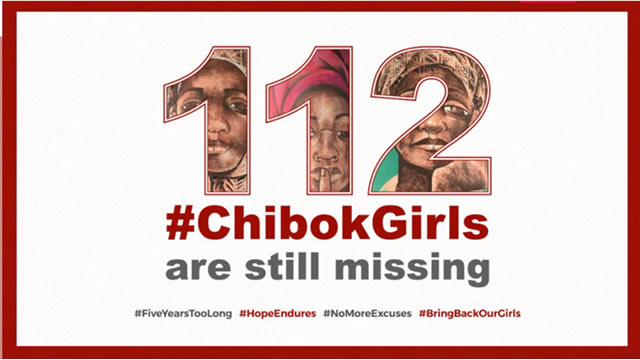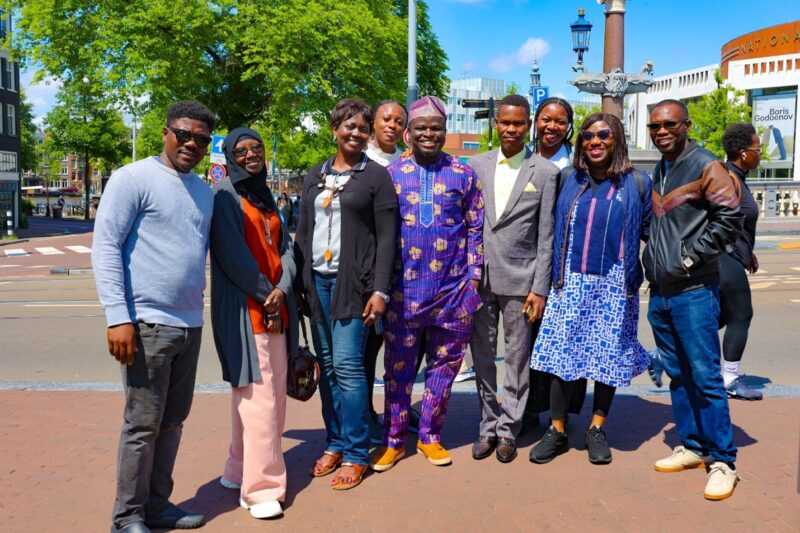On the night of April 14, 2014, two hundred and seventy-six (276) female students were kidnapped from the Government Secondary School in the town of Chibok in Borno State, Nigeria. Responsibility for the kidnappings was claimed by Boko Haram, an extremist terrorist organisation based in north-eastern Nigeria. Sunday, April 14th 2019 marks 5 years since the abduction of 276 #ChibokGirls. So far, 164 girls have either escaped, were released or found. However, 112 #ChibokGirls still remain in captivity.
111 secondary school girls, one primary school girl and boy were abducted from Government Girls Science & Technical College, Dapchi, Yobe State by a splinter group of Boko Haram on Monday, February 19, 2018. 31 days after, 5 died in captivity, 106 of the girls and the boy were released. Leah Sharibu remain in custody because she refused to renounce her faith.
On March 1, 2018, Saifura Ahmed and Hauwa Liman (Red Cross) were abducted and later executed while United Nations Children’s Fund (UNICEF) worker, Alice Ngaddah is still in captivity.
The media across the world reported and played crucial roles in providing information at the inception of the crisis. However, the media needs to do more in setting the agenda on matters that has led to the conflict and security challenges that has grown into insurgency and armed banditary in Nigeria. Reportage needs to be nuanced as matters such as unemployment, forced child marriage, access to education contributes to challenges around security across the country. One must commend Media Trust Limited, publishers of Daily Trust Newspapers for retaining a portion on its front page daily counting the days the Chibok girls have been abducted to remind us of the inhumane conditions they and others in captivity have been subjected to.
While a journalist Ahmed Salkida known to have built close links with the dreaded Islamic sect, Boko Haram on information generation was involved in the Chibok girls stories giving insights on the Boko Haram sect, there has been little or no progress reports in the rescue of those abducted in recent times especially from the Government. On August 14 2016, Salkida was declared wanted by theNigerian Army alongside 2 others for aiding Boko Haram. He was arrested weeks after by the State Security Service (SSS)at the airport in Abuja September 5 2016 and subsequently granted administrative bail the next day. In April 2018, the Federal Government, Salkida, in a war of words over the remaining Chibok girls still held in captivity by Boko Haram. Salkida revealed in twenty-six (26) tweets, that only fifteen (15) out of theone hundred and twelve (112) Chibok schoolgirls believed to be in the custody of insurgent group are still alive.He also accused the Nigerian government of negotiating for girls that are no longer existing.
The #BringBackOurGirls (BBOG) advocacy group will from Friday April 12 to Sunday April 14 2019will hold events to commemorate the 5th year of the Chibok schoolgirls’ abduction by Boko Haram.These events will be held in Lagos, Abuja, London and New York. See full schedule here.
What impact can journalists make towards the missing girls and the #BringBackOurGirls advocacy? In matters of national concern, it is expected that stakeholders puts national interest first. In the case the release of abducted persons. The media cannot play the ostrich even as it has been discovered that the challenges on the safety of journalists is hampering the media from effectively playing it role. The media must ensure they continually support the advocacy group and further ask relevant questions as well as make meaningful enquiries about the one hundred and twelve(112) girls still missing.








